- Home
- Richard K. Morgan
Market Forces Page 9
Market Forces Read online
Page 9
‘Carla?’ There was the snap of the lock being unfastened, the solid thunk as the security-bolt system she and Chris had paid to have installed was disengaged, and then the door was thrown wide. Her father stood in the doorway, a pool cue hefted in his right hand.
‘Carla, what are you doing here at this time of night?’ He switched to Norwegian. ‘And where’s Chris? You didn’t come up here alone, did you? For Christ’s sake, Carla.’
‘Hello, Dad,’ she managed.
He ushered her inside, slammed the door shut and engaged the bolt system again. Only then did he relinquish his grip on the cue, dropping the makeshift weapon into an umbrella stand by the door and opening his arms to hug her.
‘It’s good to see you, Carla. Even if it is half past midnight. What the fuck happened? Oh, don’t tell me.’ He nodded as the repressed tears began to leak out and she trembled against him. ‘Not another fight? Is he downstairs?’
She shook her head against his shoulder.
‘Good. I won’t have to be diplomatic then.’ Erik Nyquist stepped back from his daughter a little and took hold of her chin. ‘Why don’t you come and have a whisky coffee with me and we can bitch about him in his absence.’
She choked a laugh. He echoed her with a gentle smile.
‘That’s better,’ he said.
So they sat in front of an antique electric fire in the threadbare living room with mugs of cheap coffee and cheaper whisky steaming in their fists and Erik stared into the reddish glow of the heating element while his daughter talked. The tears were under control now, and Carla’s voice was firm, an analytical tool sifting through the settled sediment, first of the last few hours, then of the last few weeks, finally of the last few years.
‘It’s just,’ she said. ‘I’m sure we didn’t always used to fight this much. Did we? You must remember.’
‘Well, you never drove across the cordoned zones in the middle of the night alone because you’d been fighting,’ Erik admitted. ‘That’s a first, at least. But if I’m honest? I think you’ve been having rows with Chris about as long as you’ve known him to any appreciable depth. Certainly as long as you’ve been married. I couldn’t say if you have more now than you used to, but that’s not really the point.’
Carla looked up, surprised. ‘It isn’t?’
‘No, it isn’t. Carla, marriage is an artificial state. Invented by the patriarchy to ensure that fathers know who their children are. It’s been going on for thousands of years but that doesn’t make it right. Human beings were never designed to live like that.’
‘I think I’ve read this somewhere before, Dad.’
‘The fact that it was written by your mother,’ said Erik severely, ‘does not invalidate the argument. We are tribal, not matrimonial.’
‘Yeah, yeah. Let’s see if I remember how it went. The basic human social unit would have been a matriarchal tribe; a female, child-rearing and knowledge-keeping centre with a protective outer shell of warrior males. Uh, how does it go, children held in common by the tribe, reproduction only understood by the females and—‘
‘The point is, Carla, exclusive pairing is unnatural. Two people were never meant to be so exclusively much to each other.’
‘That’s a pretty fucking poor excuse,’ she said, then bit her lip.
Erik gave her a reproachful look. ‘That isn’t what I meant. Look, even in the recent past you had extended families to soak up some of the strain. Now we live in isolated couples or nuclear families, and either both partners are working so hard they never see each other, or they’re not working and the stress of living on the poverty line tears them apart.’
‘That’s a simplification, Dad.’
‘Is it?’ Erik cradled his mug in both hands and looked back into the red glow from the bar fire. ‘Look at where you live, Carla. A village neither of you knew the name of three years ago. No friends living close, no family, not even a workplace social life unless you’re prepared to drive for an hour and a half at the end of the evening. All these things put a huge strain on you both, and rows are the result. The natural result. It wouldn’t be natural not to fight with someone you share your whole sleeping and waking life with. It’s healthy, it provides release, and if you don’t hold grudges it shouldn’t damage the relationship.’
Carla shivered despite the fire.
‘This is damaging us,’ she said.
Erik sighed.
‘You know what your mother said to me before she went back to Tromso?’
‘Fuck you and that English bitch?’ She regretted it as soon as the words left her mouth, surprised that the anger was still there on tap nearly two decades later. But Erik only smiled wryly and if there was pain behind that, it didn’t show. She reached across to him with one hand. ‘I’m sorry.’
‘Don’t be.’ The smile flickered but held. ‘You’re right, she did say that. More than once. But she also said that it was high time, that she wasn’t really surprised because we didn’t have fun together any more. She said that. We have no fun any more, Erik.’
‘Oh, come on!’
‘No, she was right, Carla.’ He looked across at her and this time there was pain in his face. ‘Your mother was usually right about these things. I was always too busy being political and angry to spot the emotional truths. She hit the nail on the head. We didn’t have fun any more. We hadn’t had any real fun for years. That’s why I ended up with Karen in the first place. She was fun, and that was something your mother and I’d stopped trying to do years ago.’
‘Chris and I still have fun,’ Carla said quickly.
Erik Nyquist looked at his daughter and sighed again. ‘Then you hold onto him,’ he said. ‘Because if that’s true, if it’s really true, then what you’ve got is worth any amount of fights.’
Carla shot him a surprised glance, caught by the sudden gust of emotion in his voice.
‘I thought you didn’t like Chris.’
Erik chuckled. ‘I don’t,’ he said. ‘What’s that got to do with it? I’m not sleeping with him.’
She smiled wanly and went back to watching the fire.
‘I don’t know, Dad. It’s just.’
He waited while she assembled her feelings into a coherent shape.
‘Just since he went to work at Shorn.’ She shook her head wearily. ‘It doesn’t make any sense, Dad. He’s making more money than he ever has, the hours aren’t so different to what he used to clock at Hammett McColl. Fuck it, we ought to be happy. We’ve got all the props for it. Why are we falling out more now?’
‘Shorn Associates. And is he still in Emerging Markets?’
She shook her head. ‘Conflict Investment.’
‘Conflict Investment.’ Erik smacked his lips, then got up and went to the bookcase set against the wall opposite the fire. He dragged a finger across the tightly packed spines of the books on a lower shelf, found what he was looking for and tugged the volume out. Flicking through the pages, he came back to the fire and handed it to her.
‘Read that,’ he said. ‘That page.’
She looked at the book, turned it to see the title. ‘The Socialist Legacy. Miguel Benito. Dad, I’m not in the mood. This isn’t about politics.’
‘Everything is about politics, Carla. Politics is everything. Everything in human society anyway. Just read the passage in highlighter.’
She sighed and set down her coffee mug at her feet. Clearing her throat, she picked up the line with one finger and read aloud. ‘”Revolutionaries throughout the twentieth century had always been aware”?’
‘Yes. That one.’
‘”Revolutionaries throughout the twentieth century had always been aware that in order to bring about a convulsive political change”.’
‘Actually, I meant, read it to yourself.’
She ignored him, ploughing on with the edge of singsong emerging in her voice. ‘ “In order to bring about a convulsive political change, it was essential to intensify the existing social tensions to the point whe
re all would be driven to choose sides in what would thus be established as a simplistic equation of class conflict. Marxists and their ideological inheritors described this as sharpening the contradictions of society. In populist recog—“ Dad is there a point somewhere in all this bullshit?’
‘Just finish it, will you.’
She pulled a glum face. ‘”In populist recognition of this underlying truth, the cry during the latter half of the last century became if you’re not part of the solution, you’re part of the problem.” Aaaagh, new paragraph. “What any survivor of late Marxist ideology would be forced to recognise in the politics of the twenty-first century is that the contradictions are now so heavily disguised that it would be the work of decades simply to reveal them, let alone sharpen them into anything resembling a point.” A bit like this prose style, huh? Alright, alright, nearly there. “An overall problem is now no longer perceived, therefore an overall solution no longer sought. Any distasteful elements within the world economic order are now considered either candidates for longer term fine tuning or worse still an irrevocable by-product of economic laws supposedly as set in stone as the laws of quantum physics. So long as this is believed by the vast majority of the populace in the developed world, the contradictions identified by Marxism will remain hidden and each individual member of society will be left to resolve for themselves the vaguely felt tensions at an internal level. Any effort to externalise this unease will be disdained by the prevailing political climate as discredited socialist utopianism or simply, as was seen in chapter three, the politics of envy.”’ She laid down the book. ‘Yeah, so what?’
‘That’s your problem, Carla.’ Erik had not sat down while she was reading. He stood with his back to the fire and looked down at her as if she were one of his students. She felt suddenly fifteen years old again. ‘Unresolved contradictions. Chris may still be the man you married but he’s also a soldier for the new economic order. A corporate samurai, if you want to adopt their own imagery.’
‘I know that, Dad. That’s nothing new. I know what he does, I know how his world works. I help build and repair the vehicles they use to kill each other, in case you’d forgotten. I’m just as involved in it all, Dad. What?’
He was shaking his head. He crouched to her level and took both her hands gently in his own.
‘Carla, this isn’t about you and Chris. It’s barely about you at all. Benito’s talking about internal contradictions. Living with what you are, with what your society is. At Hammett McColl, Chris could do that because there was a thin veneer of respectability over it all. At Shorn, there isn’t.’
‘Oh, bullshit. You’ve read what these people are like. Dad, you used to write about what they were like, back when there was anyone with the guts to publish it. The only difference between Conflict Investment and Emerging Markets is the level of risk. In Emerging Markets, they don’t like conflict or instability. The guys in CI thrive on it. But it’s the same principle.’
‘Hmm.’ Erik smiled and let go of her hands. ‘That sounds to me like Chris talking. And he’s probably even right. But that’s not the point.’
‘You keep saying that, Dad.’
Erik shrugged and seated himself again. ‘That’s because you keep missing it, Carla. You think this is about a rift between you and Chris, and I’m telling you it’s not, it’s about a rift inside Chris. Now you’re saying there’s no difference in what he used to do and what he’s doing now, and aside from a few semantic quibbles that may be true. But Chris hasn’t just changed what he does. He’s changed where he does it, and who he does it for, and that’s what counts. Along with Nakamura and Lloyd Paul, Shorn Associates is the most aggressive player in the investment field. That applies to their Arbitrage and Emerging Markets divisions just as much as to Conflict Investment. They’re the original hard-faced firm. No gloss, no moral rationalisations. They do what they do, they’re the best at it. That’s what they sell on. You go to Shorn because they’re mean motherfuckers, and they’ll make money for you, come hell or high water. Fuck ethical investment, just give me a fat fucking return and don’t tell me too much about how you got it.’
‘You’re making speeches, Dad.’
There was a taut silence. Carla stared into the fire, wondering why she found it so easy to sink these barbs into her father. Then Erik Nyquist chuckled and nodded.
‘You’re right, I am,’ he said cheerfully. ‘Sorry about that. I miss seeing myself in print so much, it all just balls up inside me. Comes out whenever I have someone to talk to.’
‘I don’t mind,’ she said distantly. ‘I just wish ...’
‘Wish what?’
She had a vivid flash of recall, toothpaste-white. She would have been about six or seven at the time, staying with grandparents in Tromso and cocooned in the cold outside - warm inside security the visits there always brought. She remembered Erik and Kirsti Nyquist on skis, propped against each other for support on the hill behind Kirsti’s parents’ house and laughing into each other’s faces. Having fun in the definitive Nyquist fashion that she, as a child, had always imagined would characterise her future married life, the way it would always characterise her parents’.
The flash faded, into the dull red glow of the electric fire. She reached for her father’s hand.
‘Nothing.’
Chapter Eleven
‘Drink?’
Mike Bryant shook his head. ‘Still dealing with a hangover, thanks, Louise. Just water, if you’ve got it.’
‘Of course.’ Louise Hewitt closed the steel-panelled door of the office drinks cabinet and hefted a blue two-litre bottle from the table beside it instead. ‘Sit down, Mike. Drinking - or whatever - mid week, that can be a pretty lethal mistake.’
‘Not lethal,’ said Bryant, massaging his temples a little as he sank onto the sofa. ‘But definitely a mistake at my age.’
‘Yeah, must be hell being thirty-four. I remember it vaguely.’ Hewitt poured water into two glasses and sat on the edge of the sofa opposite. She looked at him speculatively. ‘Well, I won’t toast you with water, but congratulations do seem to be in order. I just got off the phone to Bangkok. That sketch on Cambodia you dropped last time you were out there finally landed on the right guerrilla head.’
Bryant sat up straighter, and forgot his hangover.
‘Cambodia? The smack-war thing?’
Hewitt nodded. ‘The smack-war thing, as you so elegantly define it. We’ve got a guerrilla coalition leader willing to deal. Khieu Sary. Sound familiar?’
Bryant drank from his water glass and nodded. ‘Yeah, I remember him. Arrogant motherfucker. Had ancestors in the original Khmer Rouge or something.’
‘Yeah.’ There was the slightest hint of mockery in Hewitt’s echo of the grunted syllable. ‘Well, it looks like this Sary needs arms and cash to hold the coalition together. The Cambodian government’s on the edge of offering an amnesty to any of the heroin rebels who want to come in and disarm. If that happens, the coalition’s gone and Sary loses his powerbase. But if he can hang on, our sources in Bangkok reckon he’s in line to march on Phnom Penh inside two years.’
‘Optimistic’
‘Local agents always are. You know how it is, they pitch rosy so you’ll bite. But this guy’s been on the money in the past. I’m inclined to go with it. So you’d better break out your copy of Reed and Mason, because this one’s yours, Mike.’
Mike Bryant’s eyes widened. ‘Mine?’
‘All yours.’ Hewitt shrugged. ‘You made it happen, you’ve got the executive experience to cover it. Like I said, congratulations.’
‘Thanks.’
‘The proposal is not uncontested,’ said Hewitt casually.
Bryant grinned. ‘What a surprise. Nakamura?’
‘Nakamura and Acropolitic both. Nakamura must have parallel information on Sary, they’re offering him essentially the same deal you put together in Bangkok, and the bastard’s smart enough to know that forcing us all to tender will bring the prices down
.’
‘And Acro?’
‘They’ve got the status quo mandate. Official economic advisers to the Cambodian regime. They’re in it to squash the proposal before it gets off the ground. It’s all already cleared with Trade and Finance.’
‘What’s the ground?’
‘North. Three-hundred-kilometre duel envelope, contracts to be signed in conference auditorium six at the Tebbit Centre. Turn up with blood on your wheels or don’t turn up. The word is Nakamura have pulled Mitsue Jones for this one. Flying her in to head up the UK team. Acropolitic don’t have anyone in her league, but they’ll no doubt be sending their finest. Against all of that, you get a team of three including you. Suggestions?’
‘Nick Makin. Chris Faulkner.’ There was no hesitation in Bryant’s voice.
Hewitt looked dubious. ‘Your chess pal, huh?’
‘He’s good.’
‘You don’t let personal feelings get in the way of professional judgment around here, Mike. You know that. It’s bad for business.’
‘That’s right, I know that. And I want Faulkner. You said this was mine, Louise. If you don’t—‘
‘Makin doesn’t like Faulkner,’ said Hewitt sharply.
‘Makin doesn’t like anyone. That’s his secret. The problem here, Louise, is that you don’t like Faulkner. And it isn’t much of a secret, either.’
‘May I remind you that you’re speaking to the executive partner of this division.’ Hewitt’s voice stayed level, just a shade cooler all of a sudden. She poured herself more water while she talked. ‘For your information, Mike, personal feelings have nothing to do with this. I don’t think Faulkner is up to a tender of this magnitude. I also think that you’re letting a friendship cloud your professional judgment and I’m going on record with that. This is going to go badly wrong if you’re not careful.’

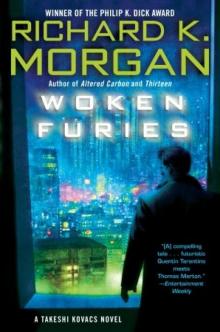 Woken Furies
Woken Furies Altered Carbon
Altered Carbon Broken Angels
Broken Angels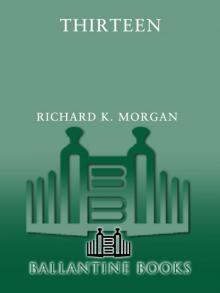 Thirteen
Thirteen The Cold Commands
The Cold Commands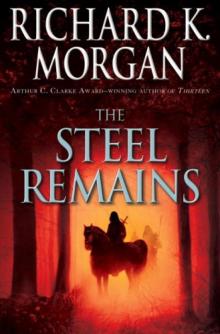 The Steel Remains lffh-1
The Steel Remains lffh-1 Market Forces
Market Forces Altered Carbon tk-1
Altered Carbon tk-1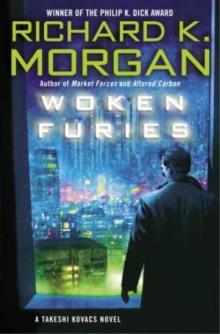 Woken Furies tk-3
Woken Furies tk-3 The Dark Defiles
The Dark Defiles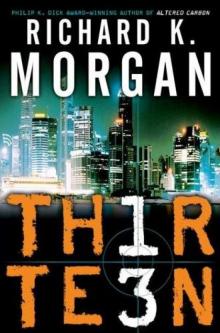 Black Man / Thirteen
Black Man / Thirteen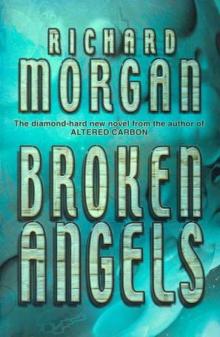 Broken Angels tk-2
Broken Angels tk-2